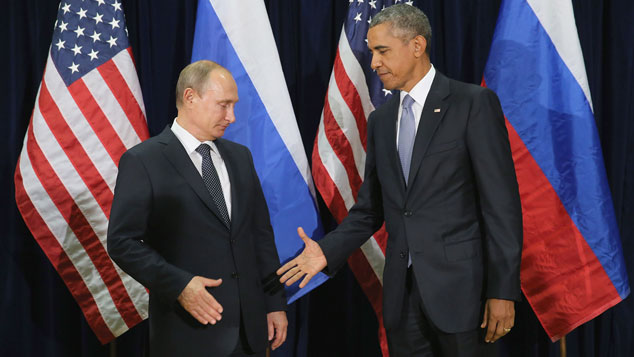
Russia stepped up military action in Syria on Wednesday. It launched a wave of airstrikes, coordinated alongside an assault by President Bashar al-Assad’s ground troops and Iranian-backed Hezbollah militias, says Jenny Booth in The Times. The Kremlin claims to be targeting Isis militants. But there are reports that it is in fact focusing on attacking other rebel groups, including moderate forces backed by the West. According to the Daily Express, Russian President Vladimir Putin is set to send 150,000 recently conscripted reservists to Syria, and he has already deployed the Spetsnaz, a battalion of elite paratroopers, to shore up the rule of Assad.
The “mutation” of Syria’s four-year civil war into a “proxy war” between outside powers has made the conflict “longer, bloodier and more dangerous to the rest of the world”, says Gideon Rachman in the Financial Times. In theory, the threat posed by the brutality of Isis should unite foreign powers. In practice, Iran, Russia and the Hezbollah military have intervened on the behalf of Assad, while the US, Saudi Arabia, the Gulf states, Turkey, France and the UK have supported forces opposed to Assad.
As a result, a conventional civil war that might otherwise have already “burnt itself” out by now risks leading to direct conflict between proxies, in this case possibly between the Iranians and the Saudis, or even between the Russians and Americans, who are already “waging a proxy war over the future of Ukraine” and are “at loggerheads over the broader concept of support for ‘regime change’ against undemocratic or oppressive regimes”.
It all means that President Obama has come under “intense scrutiny” over the past week for his stance on Syria, but he remains “defiant”, says Geoff Dyer, also in the Financial Times, saying that Russia is being pulled into a “quagmire” and turning itself into an “enemy of the majority of Syrians” and much of the Sunni population in the Middle East. Meanwhile, the British prime minister, David Cameron, said that backing Assad was a “terrible mistake” that would make the region “more unstable”.
Obama’s conviction that we need less American foreign policy, not more, is misguided, says Bret Stephens in The Wall StreetJournal. America proved it was capable of creating safe havens and enforcing no-fly zones with Operation Provide Comfort in 1991, which stopped Saddam Hussein from murdering Kurds in northern Iraq and prevented what might otherwise have been a refugee crisis to rival Syria’s.
For a “trivial” military investment, Moscow is now extending its influence, deepening a commercially and strategically productive alliance with Iraq, humiliating the US, boosting Putin’s popularity at home, and earning a geopolitical card that he can play in future negotiations. The photos of Putin and Obama at the recent UN conference say it all. Putin gazes at Obama “the way a good chess player approaches an inferior opponent, somewhere between delighted and bored by the intellectual mismatch”. And with the American presidential election still some 16 months away, it will be some time before the match gets interesting again.